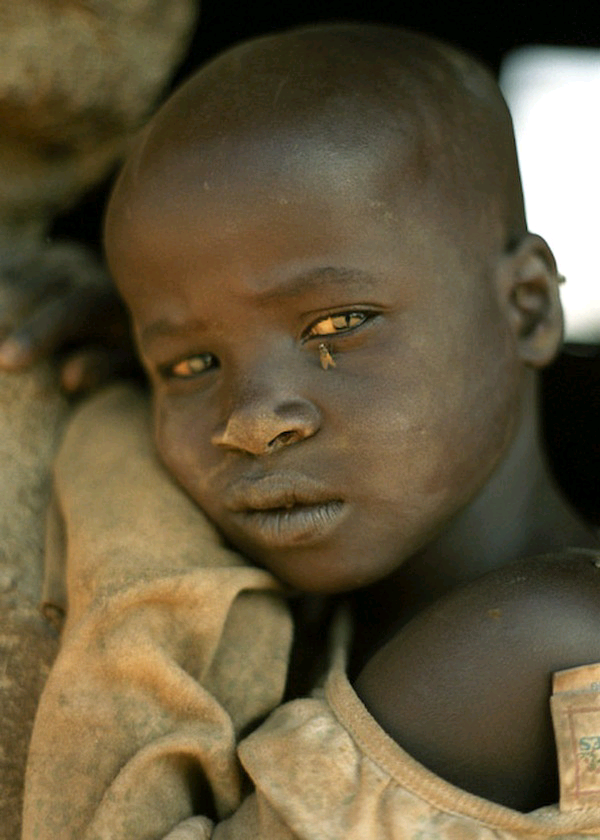How African Scientists are Leading the Fight Against Malaria
(3).jpeg)
A Legacy of Strength, But at What Cost?
Across generations, African parents have been celebrated for their resilience, sacrifice, and discipline. Their commitment to family survival through poverty, colonial trauma, war, and migration is undeniable.
However, buried beneath these legacies is a pattern of emotional distance between parents and children. Many African parents struggle to offer verbal affirmation, active listening, or vulnerability, not because they lack love, but because their love was shaped by survival, not emotional literacy.
“I know my father loves me… but he has never said it. Not once,” says Nana Kwame, a 27-year-old Ghanaian teacher.
This experience is not rare. For many African children, love is demonstrated through school fees, shelter, meals, and discipline, not emotional presence. But in today’s rapidly changing world, children are seeking more than just provision; they crave connection. So why is it so difficult for many African parents to meet them there?
The Historical and Cultural Blueprint
To understand the emotional disconnection, we must revisit Africa’s history. Many current parenting styles are a product of:
Colonial Disruption of Indigenous Parenting
Before colonialism, many African communities practiced communal child-rearing. Grandparents, aunts, uncles, and even neighbors contributed to a child's emotional and moral development. There was storytelling, proverbs, song, and ritual-rich, expressive tools for emotional learning.
However, colonial rule often dismantled these structures, replacing them with rigid, authoritarian models that emphasized obedience, punishment, and silence over emotional engagement. According to UNESCO, traditional African values were eroded by colonial religious and educational systems, which introduced shame-based parenting and discouraged open expression.
Patriarchy and Stoicism
In many cultures across the continent, fathers are socialized to be providers and disciplinarians, not nurturers. Expressing tenderness is often equated with weakness. Even mothers, while closer to their children, are trained to suppress emotions for the sake of duty.
This cultural stoicism is passed on unconsciously. Children are told to “toughen up”, “stop crying,” or “be a man” long before they understand what these commands mean.
“My mom believed hugging made us weak. ‘Talk to God, not me,’ she’d say when I was sad,” shares Lebo, a 22-year-old South African psychology student.
The Role of Trauma in Emotional Distance
Another major factor is intergenerational trauma. African parents, especially those who lived through civil wars, economic hardship, political instability, or systemic racism, may unconsciously pass down the effects of unprocessed pain.
According to The Conversation, trauma that is not healed often resurfaces as emotional suppression, emotional unavailability, or control. A parent who never received affirmation will struggle to give it. A parent who was punished for crying may view emotional openness as disrespect.
Many African parents did not have the tools, space, or language to process their feelings. So instead of warmth, they offer strictness. Instead of listening, they offer instruction. Instead of emotional presence, they offer provision.

Source: Pinterest
Expressions of Love: Misunderstood Languages
In African homes, love is often practical. It is expressed through:
Paying fees
Sacrificing comfort
Praying for the child
Correcting mistakes
Setting high expectations
But these acts, while noble, often lack verbal affirmation, physical affection, or emotional availability, things modern children increasingly recognize as core needs.
“My dad worked three jobs to put us through school. But he never once attended my school play or told me he was proud,” recalls Ngozi, a Nigerian artist. “Now I question if I was ever enough.”
This disconnect creates a love gap: parents feel they've done everything, while children feel emotionally neglected.
Technology and Generational Change
In today’s digital age, children are exposed to emotionally expressive parenting through social media, global pop culture, and mental health conversations. They now ask:
Why doesn’t my mom say “I love you”?
Why is it disrespectful to tell my dad I’m depressed?
Why do I get shouted at instead of understood?
This exposure widens the generational divide. While children seek empathy, many parents still operate from a model of control and sacrifice.
Even well-meaning parents now find themselves confused: “We gave you everything,why are you unhappy?”
When Silence Feels Safer Than Expression
In many homes, emotional expression is still considered rebellion or disrespect. Children are told:
“You talk too much.”
“You want to argue with me?”
“Don’t question your elders.”
As a result, many children learn to suppress their needs. They become emotionally self-sufficient but internally isolated.
This silence has consequences. According to a World Economic Forum article, young people across Africa are reporting rising levels of loneliness, anxiety, and identity confusion, even when living with family.
The Impact on Relationships and Identity
Children who grow up emotionally disconnected often struggle in adulthood:
They find it hard to express affection in their own relationships.
They feel guilty for having emotional needs.
They normalize emotional absence as love.
Worse still, the cycle may continue: A child raised without emotional validation may become a parent who also struggles to connect, unless they actively heal.
What Needs to Change: A Path Toward Emotional Reconnection
Breaking this cycle requires cultural honesty and emotional courage. Here are some ways forward:
Normalize Emotional Conversations
Families should carve out safe spaces during meals, walks, or prayers where children can express themselves without fear of judgment. Asking questions like “How do you feel today?” or “What was difficult this week?” can open emotional doors.
Affirmation Is Not Weakness
Parents must learn to say “I love you,” “I’m proud of you,” or “I hear you.” These words are not indulgent, they are anchors of identity.
Educate Through Media and Schools
Churches, mosques, radio stations, and schools can teach emotional intelligence as part of child development. Let African children know that being sensitive is not a flaw, and let parents unlearn toxic silence.
Therapy and Healing Spaces
Mental health professionals across the continent are working hard to change the narrative. From digital therapy apps to school counselors, African families must embrace therapy as strength, not shame.
Organizations like She Writes Woman and Mentally Aware Nigeria Initiative (MANI) are leading this movement in mental health awareness and support.
Redefine Strength
Being strong should not mean being silent, harsh, or distant. It should mean being present, gentle, and willing to grow. Parents can still lead with authority while being emotionally available.
Real-Life Stories That Reflect the Struggle
“I had to teach my mom how to hug me. At 22, I told her, ‘Please, I need affection.’ It was awkward, but it changed everything.” — Adewale, Nigeria
“I never knew I had anxiety until university. My parents thought it was laziness. Only now do they understand emotions are real.” — Asanda, South Africa
These stories echo a simple truth: the emotional gap can be bridged with patience, education, and willingness.
The Future of African Parenting
African parents are not heartless; they are often under-resourced, under-supported, and overworked. But that doesn’t mean emotional connection is out of reach.
We are in a new era where love must be felt, not just provided.
African parenting must evolve not to abandon tradition, but to enrich it. Love is not just sacrifice; it is presence, listening, empathy, and softness.
The best legacy any parent can give is not just land or degrees but emotional safety.

Source: Pinterest
Conclusion
To raise a generation that thrives, not just survives, African families must rethink emotional engagement. We must teach fathers to hug, mothers to listen, and children to speak.
Because when love is only assumed but not expressed, hearts starve quietly.
It’s time to make emotional connection a cultural norm, not a rare exception.
You may also like...
Bundesliga's New Nigerian Star Shines: Ogundu's Explosive Augsburg Debut!

Nigerian players experienced a weekend of mixed results in the German Bundesliga's 23rd match day. Uchenna Ogundu enjoye...
Capello Unleashes Juventus' Secret Weapon Against Osimhen in UCL Showdown!

Juventus faces an uphill battle against Galatasaray in the UEFA Champions League Round of 16 second leg, needing to over...
Berlinale Shocker: 'Yellow Letters' Takes Golden Bear, 'AnyMart' Director Debuts!

The Berlin Film Festival honored
Shocking Trend: Sudan's 'Lion Cubs' – Child Soldiers Going Viral on TikTok

A joint investigation reveals that child soldiers, dubbed 'lion cubs,' have become viral sensations on TikTok and other ...
Gregory Maqoma's 'Genesis': A Powerful Artistic Call for Healing in South Africa

Gregory Maqoma's new dance-opera, "Genesis: The Beginning and End of Time," has premiered in Cape Town, offering a capti...
Massive Rivian 2026.03 Update Boosts R1 Performance and Utility!

Rivian's latest software update, 2026.03, brings substantial enhancements to its R1S SUV and R1T pickup, broadening perf...
Bitcoin's Dire 29% Drop: VanEck Signals Seller Exhaustion Amid Market Carnage!

Bitcoin has suffered a sharp 29% price drop, but a VanEck report suggests seller exhaustion and a potential market botto...
Crypto Titans Shake-Up: Ripple & Deutsche Bank Partner, XRP Dips, CZ's UAE Bitcoin Mining Role Revealed!

Deutsche Bank is set to adopt Ripple's technology for faster, cheaper cross-border payments, marking a significant insti...
